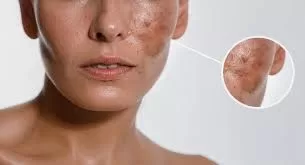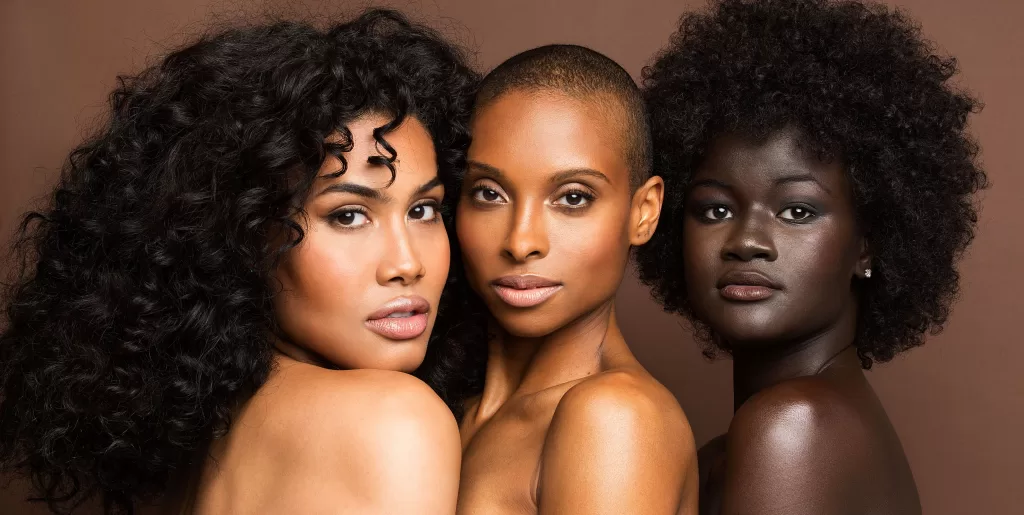How Sun Exposure Makes Acne Hyperpigmentation Worse: A Comprehensive Guide
Have you ever noticed those stubborn red or dark marks lingering after your acne clears? This is called hyperpigmentation, a common concern, especially for people with darker skin tones. While sunshine might seem beneficial for your overall health, it can actually worsen these marks left behind by acne. Let’s delve deeper into how sun exposure impacts Fading Acne Hyperpigmentation and explore ways to protect your skin.
Understanding Hyperpigmentation:
Hyperpigmentation refers to darkened areas on the skin caused by an overproduction of melanin, the pigment responsible for skin color. When acne lesions heal, inflammation can trigger melanocytes (melanin-producing cells) to go into overdrive, creating these dark patches. These marks can be red, brown, or even gray-blue, depending on your skin tone and the depth of the hyperpigmentation. While not permanent, they can take months or even years to fade completely.

There are two main types of hyperpigmentation:
- Post-inflammatory hyperpigmentation (PIH): This is the most common type, and it’s precisely what occurs after acne lesions heal. Inflammation triggers melanin overproduction, leading to darkened areas. PIH is more prevalent in people with darker skin tones.
- Post-inflammatory erythema (PIE): This type presents with red or pink marks that typically fade within weeks or months without treatment.

Why Sun Exposure Makes Hyperpigmentation Worse:
Imagine melanin as your skin’s natural sunscreen. When exposed to ultraviolet (UV) rays from the sun, your skin kicks its melanin production into high gear to shield itself from sun damage. This is why you tan after spending time outdoors. However, for those with acne hyperpigmentation, increased melanin production is counterproductive. Here’s why:
- Darkening of Existing Marks: The extra melanin production triggered by sun exposure further darkens the hyperpigmented areas, making them more noticeable.
- Prolonged Hyperpigmentation: Sun exposure can extend the lifespan of hyperpigmentation, delaying the natural fading process.
- Potential for Increased Inflammation: Some studies suggest that UV rays might further worsen hyperpigmentation by stimulating inflammation in the skin.
Protecting Your Skin from the Sun:
Since sun exposure is a significant culprit behind worsening hyperpigmentation, here are some crucial strategies to protect your skin:
- Minimize Sun Exposure: Limit direct sunlight, especially during peak hours (10 am to 2 pm) when the sun’s rays are strongest. Seek shade whenever possible.
- Sunscreen is Your Best Friend: Apply a broad-spectrum sunscreen with SPF 15 or higher every single day, even on cloudy days. Reapply sunscreen every two hours, or more often if you’re sweating or swimming.
- Sun-protective Clothing: When outdoors, wear protective clothing that covers your arms and legs. Opt for tightly woven fabrics that block UV rays.
- Shielding Accessories: Don’t forget a wide-brimmed hat to shade your face, neck, and ears. Sunglasses that block UVA and UVB rays are essential for protecting your eyes and the delicate skin around them.

Importance of Sun Protection for Darker Skin Tones:
While people with darker skin tones have a lower risk of sunburn, they are actually more prone to developing hyperpigmentation. This is because their skin naturally produces more melanin. So, sun protection through clothing, sunscreen, and seeking shade is crucial for everyone, regardless of skin color.
Treating Acne Hyperpigmentation:
While sun protection is the cornerstone of managing hyperpigmentation, there are topical treatments that can accelerate the fading process. However, it’s important to consult a dermatologist for personalized advice, as these treatments can have varying degrees of effectiveness and might not be suitable for all skin types. Here are some common options:
- Hydroquinone: This ingredient lightens the skin by reducing melanin production. However, hydroquinone can be irritating to some people, and its use might be regulated in certain areas.
- Retinoids: Retinoids, derived from vitamin A, encourage faster cell turnover. This helps shed melanin-rich cells more quickly, leading to a gradual lightening of hyperpigmentation.
- Kojic Acid, Azelaic Acid, Glycolic Acid: These ingredients work through various mechanisms to lighten hyperpigmentation. Kojic acid inhibits melanin production, while azelaic acid reduces inflammation and promotes cell turnover. Glycolic acid, an alpha hydroxy acid, helps exfoliate the skin’s surface, revealing brighter skin underneath.
- Chemical Peels and Laser Treatments: For severe cases of hyperpigmentation, a dermatologist might recommend chemical peels or laser treatments. These procedures target the deeper layers of the skin to remove hyperpigmented cells.
FAQ: Fading Acne Scars and Sun Exposure
Q: What is hyperpigmentation?
A: Hyperpigmentation is a condition where the skin produces excess melanin, resulting in dark spots or patches. It’s often a side effect of acne, where the skin’s inflammatory response triggers increased melanin production.
Q: How does sun exposure worsen hyperpigmentation?
A: Sun exposure can exacerbate hyperpigmentation in several ways:
- Increased melanin production: UV rays stimulate the skin to produce more melanin, darkening existing hyperpigmentation.
- Prolonged healing: Sun damage can slow down the natural healing process of the skin, extending the duration of hyperpigmentation.
- Potential for inflammation: UV rays might further irritate the skin, leading to increased inflammation and worsening hyperpigmentation.
Q: What are the best ways to protect my skin from the sun to prevent worsening hyperpigmentation?
A: Here are some essential sun protection tips:
- Minimize sun exposure: Limit direct sunlight, especially between 10 AM and 2 PM when the sun’s rays are strongest.
- Wear sunscreen: Apply a broad-spectrum sunscreen with SPF 30 or higher daily, even on cloudy days. Reapply every two hours, or more often if sweating or swimming.
- Protective clothing: Wear sun-protective clothing like long-sleeved shirts, pants, and wide-brimmed hats.
- Seek shade: Whenever possible, seek shade to protect your skin from the sun’s harmful rays.
Q: What are some effective treatments for fading acne hyperpigmentation?
A: While sun protection is crucial, there are topical treatments that can help accelerate the fading process. Consult a dermatologist for personalized advice, as these treatments may not be suitable for everyone:
- Hydroquinone: Lightens the skin by reducing melanin production.
- Retinoids: Derived from vitamin A, they promote faster cell turnover.
- Kojic acid, azelaic acid, glycolic acid: These ingredients work through various mechanisms to lighten hyperpigmentation.
- Chemical peels and laser treatments: For severe cases, a dermatologist may recommend these procedures.
Remember: Consistent sun protection is key to preventing worsening hyperpigmentation and promoting clearer skin.
Conclusion: Fading Acne Hyperpigmentation
Sun exposure is detrimental to acne hyperpigmentation. By minimizing sun exposure and using broad-spectrum sunscreen

Explore more articles like this @ Where And How Resources
If you found this article helpful, don’t forget to share it with your friends and followers!